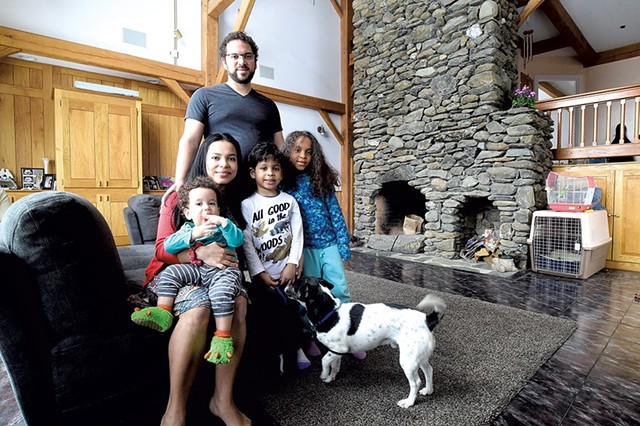click to enlarge 
- File: Jeb Wallace-Brodeur
- The Turner family, who got a moving grant after relocating to Cambridge
Vermont will continue to reimburse some newcomers’ moving expenses through its new worker program, but lawmakers have called for a study to determine whether it actually attracts people who wouldn’t have moved to the state otherwise.
The House on Wednesday voted unanimously in favor of a bill that includes $630,000 for the program. The bill has been sent to the governor for his signature.
The Senate Committee on Economic Development, Housing and General Affairs had proposed this year to make the popular program permanent, and to spend $1 million annually to reimburse workers who were new to the state up to $5,000 for moving expenses. That amount could rise to $7,500 for someone who moved to an area with a higher-than-average unemployment rate or lower-than-average annual wages.
The original program reimbursed people who were moving to Vermont to take remote jobs. After Vermont employers let lawmakers know they needed workers too, that program was modified to include those moving into the state to take any jobs.
This week, the House Appropriations Committee trimmed the proposal back, allocating $630,000 for the new and remote worker program.
The move ran counter to strong support in the Senate Economic Development Committee, which had created the program and touted its success in drawing media attention and applications from all over the U.S. and internationally.
“Certain members of the Senate think it’s the best thing since sliced bread; we’re not of the same opinion,” said Rep. Charles Kimbell (D-Woodstock) of the remote worker program. “I don’t say it’s universal. The Senate operates differently from the House. If it’s one person’s strong opinion, usually that carries the day. In the House, it doesn’t work that way.”
The bill also calls for consultants to study the programs and deliver a report by December 15.
“This was a difficult discussion with the Senate,” said Rep. Mike Marcotte (D-Coventry) on Wednesday on the House floor, via Zoom.“I think many of us here know that the House is not a big fan of the remote worker program. However, understanding how important this is to the Senate, we worked hard” on a compromise, he said.
The study, Marcotte said, will be designed to show whether the state is getting its money’s worth from the programs. Critics have noted that Vermont swelled with newcomers in 2020. But it’s not yet clear if those new arrivals plan to stay after the pandemic eases.
State Auditor Doug Hoffer has criticized the program in the past, saying the money should be used instead to help existing residents.
The state Agency of Commerce and Community Development, which administers the programs, said in its 2020 annual report that 51 grants were awarded in 2019, with an average grant of $4,458. The agency said 84 people, including family members of workers, moved into the state as a result.
Sen. Alison Clarkson (D-Windsor), vice chair of the Senate Economic Development Committee, said the program could help reverse Vermont’s glide toward an older population.
“If we all agree we want to attract people to the state, and new families living in our fabulous downtowns, we need to be attracting new workers to Vermont,” Clarkson said. “I hope this report due in December will vindicate us and encourage us to invest more in them.”
Charles Martin, the Vermont Chamber’s lobbyist, would also like the moving reimbursements to continue.
“It’s obviously not the be-all solution, but we support the intent of the program,” he said. He noted that a lot of Vermont employers are looking for help right now. “Obviously we’d like to see as much investment in recruiting folks to the state of Vermont as possible,” he said.






















































